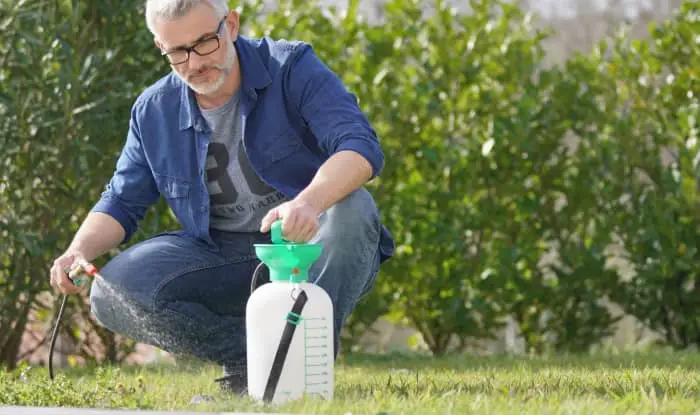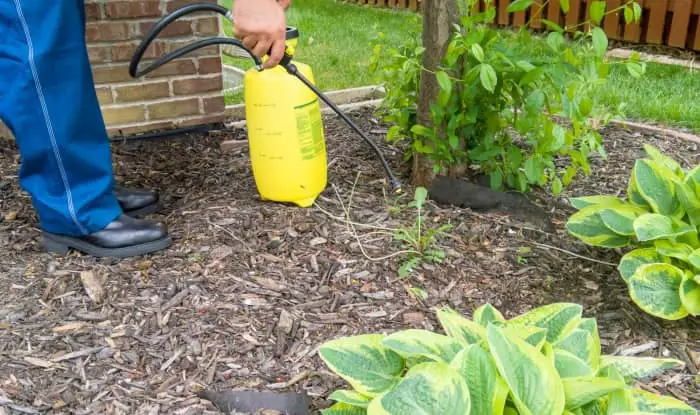Many gardeners prefer using organic herbicides for weeds growing in their garden.
Organic herbicides don’t leave chemical residues that contaminate edible plants. And they don’t pose the same safety hazard to your children and pets.
What are they? And how do you use them for the best results?
In this article I’ll show you some of the most popular organic herbicides, what you can use them for, and give you tips to get the most out of your organic weed control.
Let’s dive in.
What Are Organic Herbicides?
Organic herbicides consist of naturally occurring chemicals. They are different from synthetic herbicides that consist of inorganic chemicals.
Organic herbicides and synthetic chemical herbicides are both effective at killing weeds. But one of the big advantages of using organic herbicides is that they quickly break down and don’t have a lasting effect in the soil. And they’ve become more popular in recent times due to increased awareness of the health and environmental concerns of synthetic herbicides.
But, organic herbicides are not always the best choice:
Firstly, they don’t always work as well as synthetic herbicides, so they often need more applications. And it’s often a good idea to use organic herbicides together with mechanical and cultural weed control practices.
Secondly, because organic herbicides are non-selective they can harm any plants you apply them to. So they don’t just kill weeds, they will also damage grass and desirable plants in your garden.
How Organic Herbicides Work
You can divide organic herbicides into two types: post-emergent herbicides that kill weeds already growing above ground. And pre-emergent herbicides that prevent weed seeds from sprouting after germination.
Post-emergent organic herbicides work on contact. This means they only affect the parts of the plant you spray them on. Post-emergent herbicides can quickly kill weeds above ground, but if they don’t affect the roots, perennial weeds with established root systems will grow back. So killing weeds with organic herbicides sometimes requires repeated applications.
Post-emergent organic herbicides work by dessication. They disrupt plant cellular membranes leading to the plant dying from water loss (1).
Organic herbicides work by desiccation = leaves dry out = plant death is caused by water loss. Thus, organic herbicides perform reasonably well on ANNUAL broadleaf weeds and grasses, especially young plants less than 30 days old or 6 inches high…. Mature perennial weeds (with long tap roots) and perennial grasses (with growing points below soil surface) are rarely killed by desiccant herbicides because these are contact chemicals only — the herbicide is NOT translocated to roots or other underground parts of the plant.
– World Agriculture Solutions
Pre-emergent organic herbicides, such as corn gluten meal, change the conditions of the soil so that weeds can’t grow.
Using Organic Herbicides For Weeds
Because post-emergent organic herbicides are usually non-selective, they are difficult to use on your lawn. And you need to be careful when using them in garden beds, shielding desirable plants as you spray so that the herbicide doesn’t make contact with them.
Organic herbicides are easiest to use in areas where you don’t want any plants to grow, so you don’t have to worry where you spray.
Organic herbicides are most effective when used on small, young weeds. But they’re less effective on older, more mature plants.
Organic Herbicide List
-
Vinegar — acetic acid at concentrations between 15-30% can kill weeds. Household vinegar with a much lower acetic acid concentration is rarely effective. Instead, look for horticultural vinegar.
-
Citric acid — works similar to vinegar when used at an appropriate concentration. Citric acid is sometimes used together with acetic acid in commercial organic herbicides.
-
Pelargonic acid — extracted from Pelargonium roseum leaves.
-
Essential oils — these include clove oil, cinnamon oil, peppermint oil, and lemongrass oil.
-
D-limonene — a common terpene that’s extracted from citrus rinds.
-
Herbicidal soaps — dissolve the waxy coating from cell walls.
-
Corn gluten meal — an organic pre-emergent herbicide that prevents weed seeds from developing into mature plants after germination.
Commercial Products
There aren’t as many organic weed killers available compared to synthetic chemical weed killers. Here are some of the most commonly used products:
Organic Herbicide Examples
-
Green Gobbler — 20% acetic acid
-
Weed Pharm — 20% acetic acid
-
Matratec — 50% clove oil
-
GreenMatch EX — 50% lemongrass oil
-
WeedZap — 45% clove oil + 45% cinnamon oil
-
Avenger Weed Killer — 70% d-limonene (OMRI listed organic herbicide and EPA certified)
-
C-Cide — 5% citric acid
Product Effectiveness With Weed Age
| Product | 12 days | 19 days | 26 days |
|---|---|---|---|
| Vinegar – 20% Acetic Acid | 61% | 11% | 17% |
| Matran 15% | 88% | 28% | 0% |
| GreenMatch EX 15% | 89% | 11% | 0% |
| WeedZap 10% | 100% | 33% | 38% |
| Untreated Weeds | 0% | 0% | 0% |
Source (2)
Economic Considerations
Organic herbicides are effective when used in sufficient quantity and at the right concentration. But they usually work out more expensive than synthetic herbicides.
This sometimes means it isn’t affordable to use organic herbicides for commercial crop production. And the economic considerations of choosing this type of weed killer are important if you have a large area of weeds to clear on your property.
Are Organic Herbicides Safe?
Not all organic herbicides are safe. Some organic herbicides, such as high-strength vinegar, are very toxic and can burn your skin. So it’s a good idea to wear protective gear when using them. But unlike synthetic chemical herbicides, organic herbicides don’t leave potentially harmful chemical residues on plants and soil. So it’s safer for long-term health to use organic herbicides in your vegetable garden.
Tips for Effective Organic Herbicide Use
Here are some important tips to help you get the best results when using organic herbicides for weeds:
-
Organic herbicides work best on young weeds in the cotyledon or first true leaf stage (2).
-
It’s often advised to use organic herbicides along with cultural practices and weeding methods such as hand weeding. Using a range of weed control strategies is particularly important for economic weed management on organic farms (3) and vineyards.
-
Organic herbicides work as contact weed killers, so you need to soak all parts of the plant.
-
Perennial weeds with established root systems and perennial grasses that grow from beneath the soil surface can be difficult to kill with organic herbicides, often requiring repeated applications.
-
Organic herbicides work better when the sun is shining and the temperature is above 75°F.
-
Unlike some synthetic chemical herbicides, post-emergent organic herbicides don’t have residual activity. So they won’t stop new weeds from growing in the treated area.
-
Organic herbicides usually work better at controlling broadleaf weeds than grassy weeds.
References:
- Organic Herbicides – https://worldagriculturesolutions.com/2015/05/08/organic-herbicides/
- Organic Herbicides – Do They Work? – https://ucnfanews.ucanr.edu/Articles/Feature_Stories/Organic_Herbicdes_-_Do_They_Work/
- Weed Management On Organic Farms – https://content.ces.ncsu.edu/weed-management-on-organic-farms



